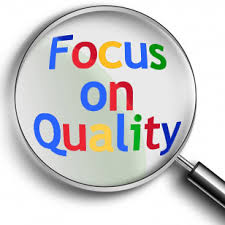 In May, changes to Google results were the consequence of a change in how Google assesses quality content. In May, changes to Google results were the consequence of a change in how Google assesses quality content.
Google admitted that while no spam-related update had occurred, there were changes to its core ranking algorithm in terms of how it processes quality signals - in other words a "quality update".
It is hard to get any specifics from Google, but we know from past statements that a page's quality is determined by a wide range of individual factors. We generally hear about updates from website owners who have lost visibility speaking up. This update seems to have affected many sites, with some reporting declining visibility, while others have gained. This is in line with the little information gleaned from Google, that they didn't go after any particular class of sites or individual sites, but rather it was an update of the overall ranking algorithm.
Although we are not able to give you any detailed advice, apart from focusing on constantly making improvements to your website aimed at your users and overall quality, in line with this, we have summarised below advice from a Google page containing guidance on how to build high-quality websites and although published in 2011, still contains relevant advice on how to help ensure your website ranks well in Google ...
***
(Excerpts from a Google article)
Search is a complicated and evolving art and science, so rather than focusing on specific algorithmic tweaks, we encourage you to focus on delivering the best possible experience for users.
What counts as a high-quality site?
If you want to step into Google's mindset, the questions below provide some guidance on how we've been looking at the issue:
- Would you trust the information presented in this article?
- Is this article written by an expert or enthusiast who knows the topic well, or is it more shallow in nature?
- Does the site have duplicate, overlapping, or redundant articles on the same or similar topics with slightly different keyword variations?
- Would you be comfortable giving your credit card information to this site?
- Does this article have spelling, stylistic, or factual errors?
- Are the topics driven by genuine interests of readers of the site, or does the site generate content by attempting to guess what might rank well in search engines?
- Does the article provide original content or information, original reporting, original research, or original analysis?
- Does the page provide substantial value when compared to other pages in search results?
- How much quality control is done on content?
- Does the article describe both sides of a story?
- Is the site a recognized authority on its topic?
- Is the content mass-produced by or outsourced to a large number of creators, or spread across a large network of sites, so that individual pages or sites don’t get as much attention or care?
- Was the article edited well, or does it appear sloppy or hastily produced?
- For a health related query, would you trust information from this site?
- Would you recognize this site as an authoritative source when mentioned by name?
- Does this article provide a complete or comprehensive description of the topic?
- Does this article contain insightful analysis or interesting information that is beyond obvious?
- Is this the sort of page you’d want to bookmark, share with a friend, or recommend?
- Does this article have an excessive amount of ads that distract from or interfere with the main content?
- Would you expect to see this article in a printed magazine, encyclopedia or book?
- Are the articles short, unsubstantial, or otherwise lacking in helpful specifics?
- Are the pages produced with great care and attention to detail vs. less attention to detail?
- Would users complain when they see pages from this site?
What you can do?
We encourage you to keep questions like the ones above in mind as you focus on developing high-quality content rather than trying to optimize for any particular Google algorithm.
One other specific piece of guidance we've offered is that low-quality content on some parts of a website can impact the whole site’s rankings, and thus removing low quality pages, merging or improving the content of individual shallow pages into more useful pages, or moving low quality pages to a different domain could eventually help the rankings of your higher-quality content.
We're continuing to work on additional algorithmic iterations to help webmasters operating high-quality sites get more traffic from search. As you continue to improve your sites, rather than focusing on one particular algorithmic tweak, we encourage you to ask yourself the same sorts of questions we ask when looking at the big picture.
***
We would suggest that you take the time to go through your website and see if there are areas where you could improve the quality of the information you have provided and talk to us about any updates that you think could help with your website's searchability.
|